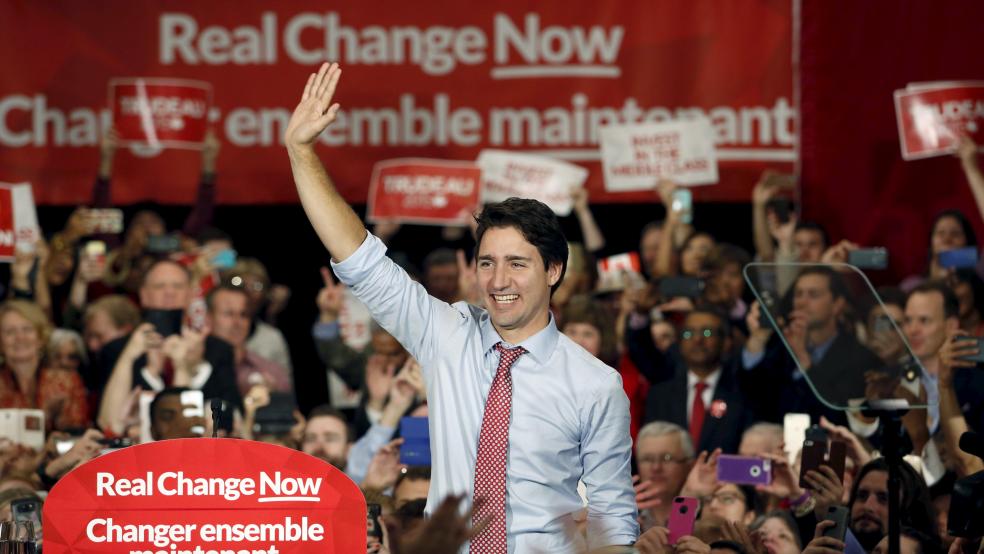On Monday, Canada embraced its own version of hope and change.
Justin Trudeau, the 43-year-old telegenic leader of the down-on-their-luck Liberals, led his party to an unexpectedly large victory, after lagging in the polls until just last week. He ran a relentlessly positive campaign, andnoted in his victory speech Monday night that "Sunny ways, my friends, sunny ways, this is what positive politics can do." Not coincidentally, one of Trudeau's campaign advisers was David Axelrod, the mastermind behind President Obama's 2008 victory south of the 49th parallel.
But Trudeau, a former teacher, also shares something in common with Obama's conservative predecessor, George W. Bush: dynasty. Trudeau is following his late father, Pierre Trudeau, into the prime minister's house, where Justin was born and spent much of his childhood during his legendary father's 15 years as leader of Canada. Like Bush, Trudeau's opponents tried to paint him as an intellectual lightweight, and voters didn't seem to buy it or didn't care.
Related: How the Liberal’s Win in Canada Could Hurt the F-35
But Justin Trudeau isn't Bush or Obama or his father, and Canada isn't the United States. Canada is the U.S.'s closest neighbor and largest trading partner, however, so what happens in Ottawa matters in Washington. What will the Liberal landslide in Canada, and the exit of Conservative Prime Minister Stephen Harper, mean for its southern neighbor? Here's a brief look at some possible fallout.
1. U.S.-Canada relations will be warmer, at least for another year.
During the campaign, Trudeau pledged to improve Canada's relationship with the U.S., which is at a recent low due to disagreements between the Obama and Harper governments over topics ranging from climate change to the environment. The proposed rekindling of warm feelings between the two governments should last at least until the end of the Obama administration, but you can see it cooling pretty quickly if, say, a President Donald Trump takes office in January 2017.
2. Obama will face less pressure on Keystone XL but more on the Trans-Pacific Partnership.
One of the sore points between Obama and Harper was the Keystone XL pipeline, which would send Canadian tar sands down into the U.S. for processing and shipping or consumption. Obama hasn't approved the pipeline, while Harper, The Wall Street Journal notes, called the pipeline a "no brainer." Trudeau also supports Keystone but has said it isn't worth straining bilateral relations over. The huge Pacific Rim free trade deal is a point of agreement between Obama and Harper, and Trudeau hasn't taken a definitive stand on TPP yet and won't until the full text is made public. Trudeau generally supports free trade, and has said positive things about TPP, but the possibility that the new Liberal government won't ratify the agreement is another question mark hanging over Obama's biggest foreign trade accomplishment.
Related: Canada's new Liberal PM Trudeau under pressure to perform
3. Canada's proposed infrastructure spending could marginally boost the U.S. economy.
Under Harper, Canada has become more dependent on mining and oil drilling while its manufacturing sector has declined. The hit to the Canadian economy when oil prices dropped was one of the factors in Harper's loss, but so was Trudeau's plan to revive the economy and boost the manufacturing and construction sectors by investing in infrastructure and running a modest deficit for his first three years in office to finance it. He also has pledged to cut taxes on the middle class by raising them on the top 1 percent of earners. Given the key trade relationship between the two neighbors, any improvement in Canadian consumption and consumer confidence should seep down into the U.S. economy.
4. America's legal-marijuana movement might get a boost.
Harper is a strong and vocal opponent of marijuana, legal for medical purposes in Canada, while Trudeau has promised to legalize it nationwide and regulate its sale and distribution. Washington, Colorado, Alaska, and Oregon — the four states where marijuana is legal for any purpose — have a combined population of about 17 million, and if regulating and taxing pot doesn't have any terrible downside in those laboratories of democracy, the legalization movement will probably spread. Canada has 35 million people, and if Trudeau does manage to legalize the drug for recreational purposes and it goes smoothly, that's a big argument in favor of at least decriminalizing marijuana throughout the U.S. Canada, after all, legalized same-sex marriage in 2005, the institution of marriage didn't crumble, and America followed suit eight years later.
This article originally appeared on The Week. Read more from The Week:




